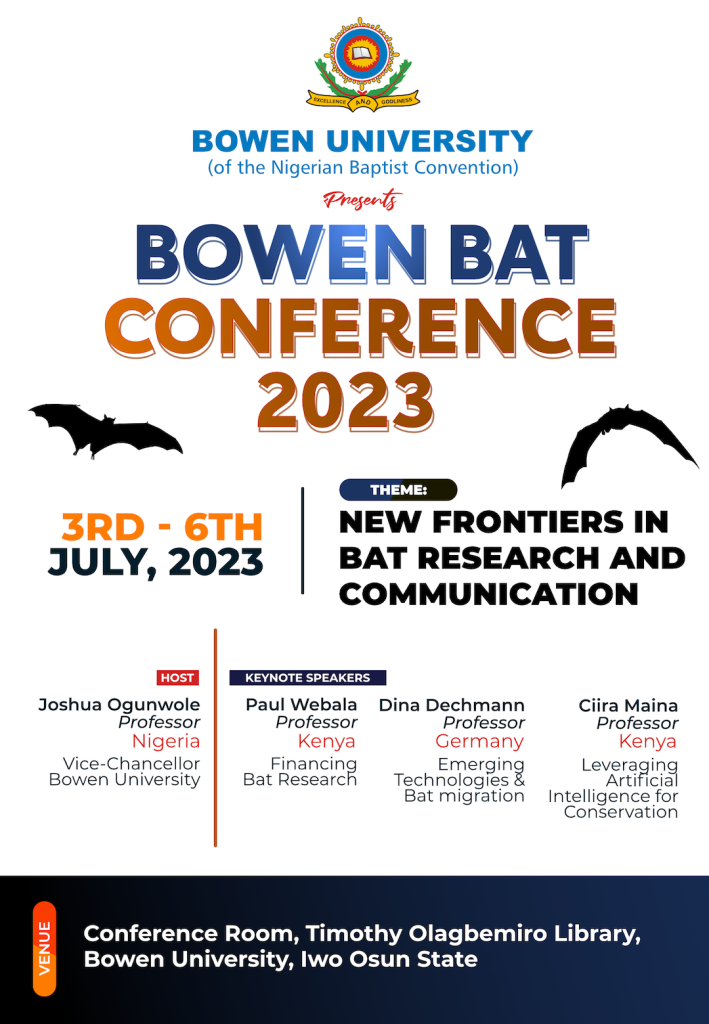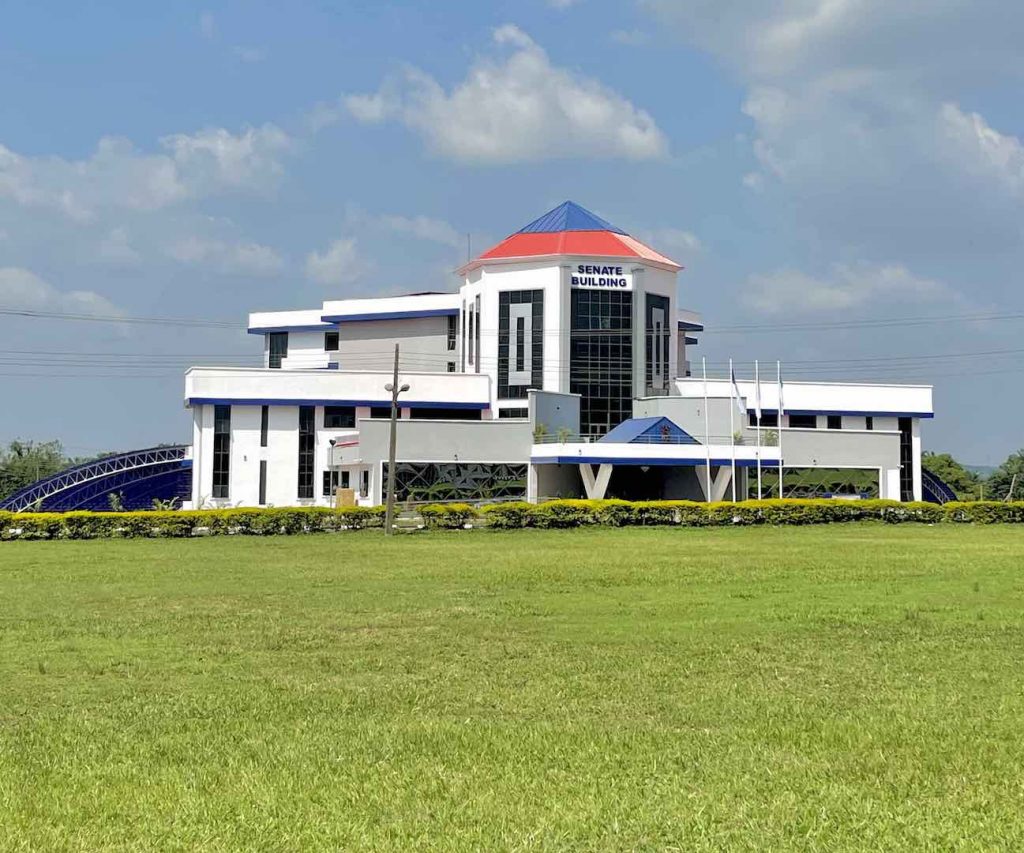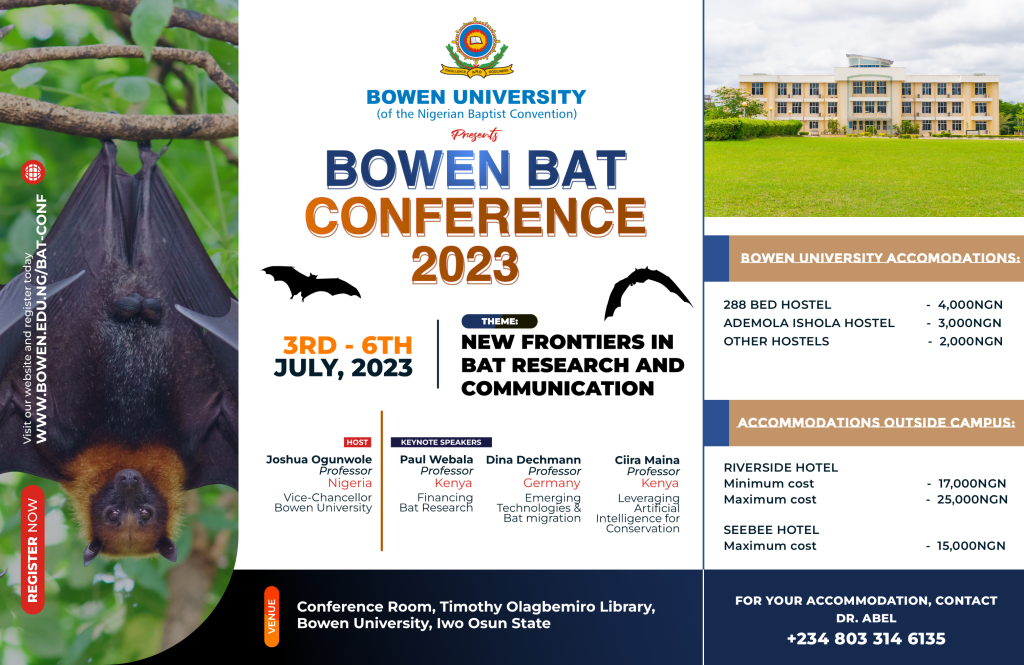Bat Conference 2023
Regional Bat Conference on Bat Conservation.

About the Conference
Bats are unique mammals with the capability of true flight. They are of great importance in cultural and scientific settings; and their importance have been grossly underestimated. This conference aims to bring together researchers in various fields of bat study on the need for concerted efforts to demystify and improve the conservation status of bats, especially in Africa through collaborative research and effective communication. In conjunction with other collaborators, this conference will also promote the image of Bowen University among institutions with great interest in bat study and conservation in Africa.
- To bring together scientists in various fields of bat study and foster research networks in Nigeria and beyond on current research trends.
- To emphasize a multi-disciplinary approach to bat research.
- To train young and upcoming scientists on current techniques in bat study.
- To promote the image of Bowen University among stakeholders of conservation research at national and global levels.
- To encourage partnerships with Conservation bodies and Centers of Research Excellence.
Brief about
Bowen University
Bowen University is a foremost private and Christian University on the continent of Africa established by the Nigerian Baptist Convention in 2001. Bowen University, however, commenced academic activities on 4th November 2002. It is one of the oldest private institutions of higher learning in Nigeria. The University is in Osun State, southwestern Nigeria.
The University is blessed and maintains a serene and peaceful ambience – the peaceful atmosphere, many attested to as reason for having bats of various species in their numbers on the campus.
Bowen University operates a Modified Collegiate System with Seven (7) fully operational colleges viz College of Postgraduate Studies, College of Computing and Communication Studies, College of Health Sciences, College of Liberal Studies, College of Law, College of Agriculture, Engineering and Sciences and College of Social and Management Sciences. The University has a staff strength of Eight Hundred and Twenty-Six (826) and student population of Four Thousand, Seven Hundred and Fifty-One (4,751) as of April 2023. Her products spreads across all regions of the world doing excellently well in their chosen areas of calling.
To navigate your way on Bowen University campus, use the virtual tour link:

It is worth mentioning that the University houses the world’s first and only deployed Super Dual Auroral Radar Network (Super DARN) around the equator. The system is named Virginia Tech-Nigerian Bowen Equatorial Aeronomy Radar (VT-NigerBEAR). The radar network is the 36th of such in existence around the world; it is a network of high frequency radars that investigates the earth’s upper atmosphere, providing insight into variations in atmospheric conditions and weather hazards.
Having enjoyed great and productive leadership since inception, the University’s current Vice-Chancellor, Prof. Joshua Olalekan OGUNWOLE, is ably supported by his management team, Provosts of Colleges, Directors, and Heads of Units.
History of Bat Study in Bowen University
There exists a large fruit bat colony on Iwo campus (College section) of Bowen University, in fact, the fruit bat population is one of the three dominant and obvious groups in the Bowen community aside from staff and students. Bowen University, established in 2001, operates two campuses in Iwo and Ogbomoso; both located in Southwest Nigeria. Although Iwo campus houses several species of bats (mostly yet to be identified), the dominant population is identified to be the straw-coloured fruit bat, Eidolon helvum, which is the second largest and most widely distributed of the African megabats. These bats have been associated with big cities in sub-Saharan Africa and have been the subject of scientific studies in some institutions of higher learning. Their presence became obvious in 2005 when the University was to graduate its first set of students. The large fruit bat colony became a subject of concern in 2018 because of their distressing noise, offensive odour and pollution of environment with their excrement. Bowen University, rather than eliminating them through various human interventions, decided to conserve this species. Eventually the University organized the first research commencement lecture series titled “Bats in Bowen University: Decoding the cryptic message of a research opportunity”, which was in line with the research theme of the University “Putting Science into indigenous knowledge”. It was noted that the IUCN status of E. helvum is Near Threatened, and the global population is reported to be declining mainly due to human persecution. The lecture concluded as follows: “the presence of a large colony of straw-coloured fruit bat on Bowen campus may seem to pose a threat because of their distressing noise, defoliation to upper reaches of the tree canopy on which they roost, and messy guano droppings, however, they should also be seen as opportunities for research”. The University in 2020 funded bat study through a grant and has attracted another grant from Data Science Africa on bat telemetry. Bowen University will be pleased to host a conference to enhance collaborative research and communication on bats study.
Conference Keynote Speakers.
Paul Webala
(Kenya)
Professor
Financing Bat Research
Dina Dechmann
(Germany)
Professor
Emerging technologies and bat migration; implications for understanding bats in Africa.
Ciira Maina
(Kenya)
Professor
Emerging technologies and bat migration; implications for understanding bats in Africa.
Note:
For field sessions participants should wear (Wellington) boots, trousers and long-sleeved or well-covered tops. To handle bats, participants must show proof of anti-rabies vaccination.
For accommodation, please contact Abel on 08033146135.

Get registered today!
Early bird registration on or before 15th May 2023 16th JUNE 2023.
Expected participants include undergraduate and postgraduate students in relevant fields of bat study, as well as post-doctoral researchers, conservation scientists, lecturers, naturalists, health care researchers, data scientists, mechanical and acoustic engineers, communicators, photojournalists, etc.
Call for Abstracts
Abstracts of original research/review manuscripts are invited from interested participants in any area that agree with the theme and subthemes of the conference. Abstracts submitted will be peer-reviewed and only accepted abstracts will be published in the Book of Abstracts. Authors will be informed of the status of their submissions, and they must have duly registered for the conference before oral or poster presentation.
Instruction to Authors
- To submit an electronic copy of Abstracts click the Call for Abstract button below.
- Email address and phone number of correspondence author should be indicated.
- The sub-theme for which the Abstract is appropriate must be indicated.
- Author(s) of accepted Abstract(s) must pay the conference registration fee to facilitate inclusion of the articles abstract (s) in the Book of Abstracts.
Paper Presentation
Authors of accepted Abstracts should prepare for power point or poster presentation. Presenters will have ten minutes for presentation and five minutes for questions and answers.
Guidelines for Abstract Preparation
Author(s)/Contributors should follow these guidelines for Abstracts preparation and submission:
- Abstracts should be submitted in MS Word, Times New Roman and 12-point size.
- Abstract should be in single line spacing, and line numbered.
- Abstract should not have more than 300 words and 5 key words.
- Measurement should be in International System of Units (SI) provided with alternate unit in parentheses for the convenience of readers who are not vast in SI units.
- Abstracts that fail to comply with these guidelines will be rejected.
Important Dates
- Deadline for Abstracts submission –
19th May 202316th June 2023 - Notification for Abstracts acceptance –
31st May 202323rd June 2023
